
Saturated fat is a fat that is solid when at room temperature. This happens because all of the carbon molecules are connected by double bonds. Butter is an example of a food high in saturated fat. On the other hand, olive oil contains unsaturated fats, and that is why it is liquid at room temperature rather than solid.
Foods high in saturated fat have long been associated with raising “bad” LDL cholesterol levels and increasing the risk of heart disease, cardiovascular disease, and certain inflammatory conditions. However, there is also newer evidence potentially debunking this thinking, as some studies show that certain saturated fats, such as those found in coconut, can lower cholesterol levels and reduce the risk of cardiovascular disease.
Most nutritionists and dietitians suggest limiting your intake of processed saturated fats—such as those in hot dogs, doughnuts, or mayonnaise—to no more than 10% of your daily caloric intake or a daily value of 20 grams. Instead, focus on foods high in monounsaturated fats and polyunsaturated fats, such as anti-inflammatory omega-3 fatty acids. Not sure what kind of fat is in your favorite foods? Keep reading for a list of high saturated fats foods, and see if you can replace some of them with healthier options.
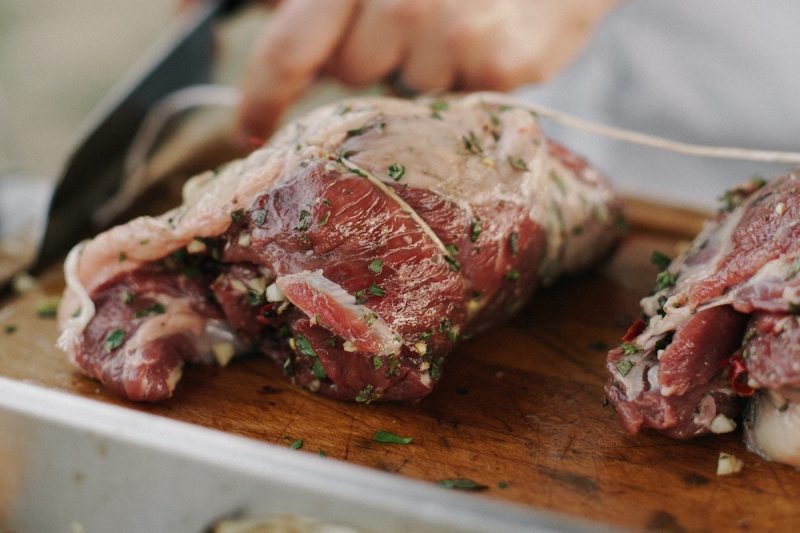
Foods high in saturated fat
Red meat
Red meat, such as beef, lamb, and veal, can be quite high in saturated fat, depending on the cut. For example, three ounces of beef short ribs have about 15.1 grams of saturated fat or 76% of the daily value, and a pork chop with fat provides about 46% of the daily value.
While these meats may be juicy and rich, you’re typically better off going with a leaner cut to save on calories and reduce the saturated fat content. This isn’t to say red meat needs to be avoided altogether, as it still offers plenty of essential nutrients, including protein, iron, and biotin, which are vital for your hair, nerves, and skin.

Hot dogs and sausages
Hot dogs, sausages, and pork products such as bacon are quite high in saturated fat. They also tend to contain excessive amounts of sodium, which can increase your blood pressure. Consider turkey bacon, turkey hot dogs, or vegan options made with soy, as these options will be lower in fat and may provide additional nutrients.
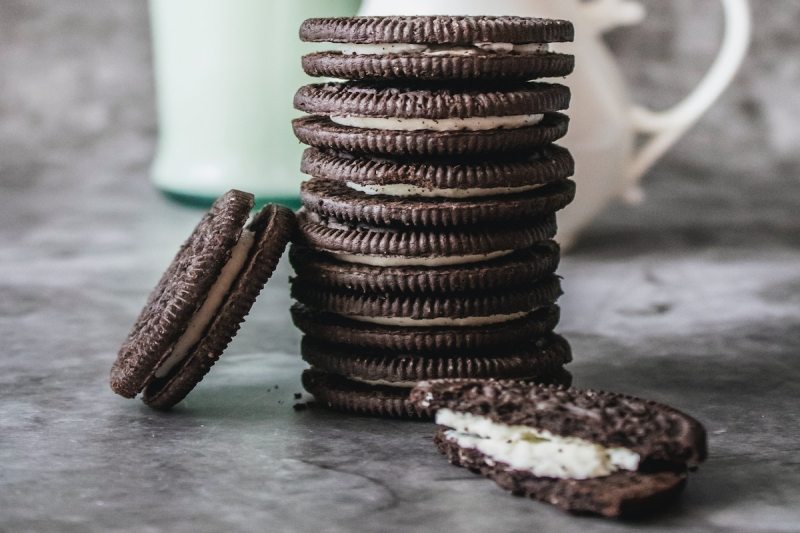
Cookies
Depending on the specific ingredients used, processed and packaged cookies can be high in trans fats and saturated fats. Cookies made with a lot of butter or shortening or that contain cream-based fillings will be higher in fat.
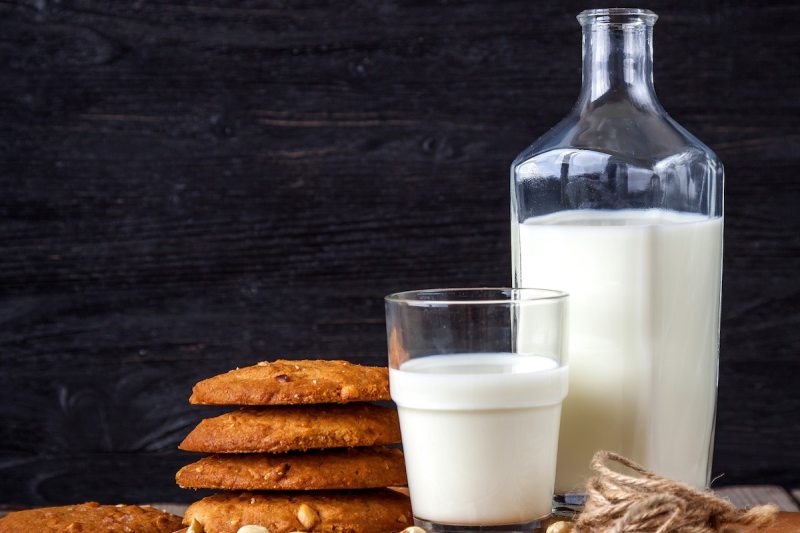
Whole milk, cream, and full-fat dairy
Full-fat dairy products contain some of the highest amounts of saturated fat. Whipped cream, for example, tops the charts with a whopping 23.2 grams of saturated fat per cup, which is more than a day’s worth in terms of the recommended daily value. Cream, ice cream, and half-and-half are also high in saturated fat, as they contain more fat than milk. Whole milk contains 9.1 grams (46% of the daily value) per cup, while 2% milk drops to 31% DV.
That said, dairy products are a good source of calcium and vitamin D for strong bones and teeth. Full-fat yogurt also contains a fair amount of saturated fat (about 25% DV per cup), but it contains gut-healthy probiotics as well.
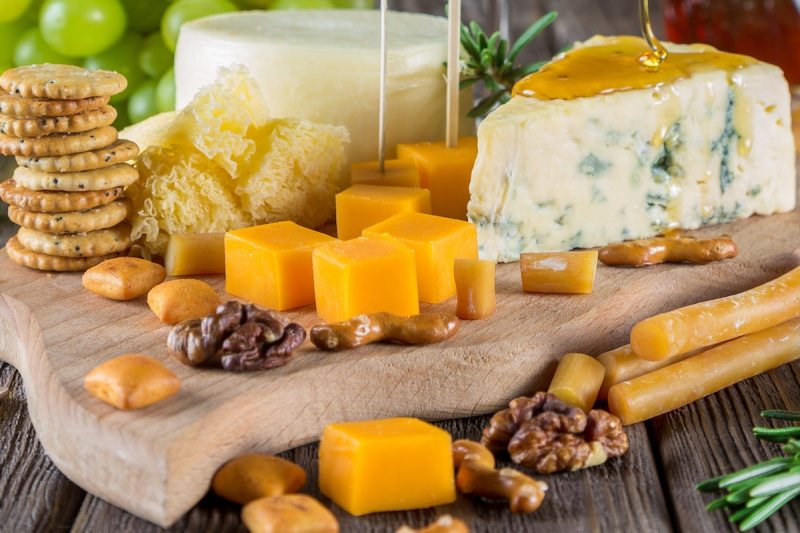
Cheese
Cheese can be quite high in saturated fat, depending on the variety. For example, a 1/2 cup serving of ricotta has eight grams, which is 40% of the daily value. Goat cheese, Colby, and cheddar are also high in saturated fat. Cheese can provide healthy nutrients, though. For example, Parmesan cheese is quite high in calcium, and dairy products generally can support restful sleep as they are high in melatonin and tryptophan.
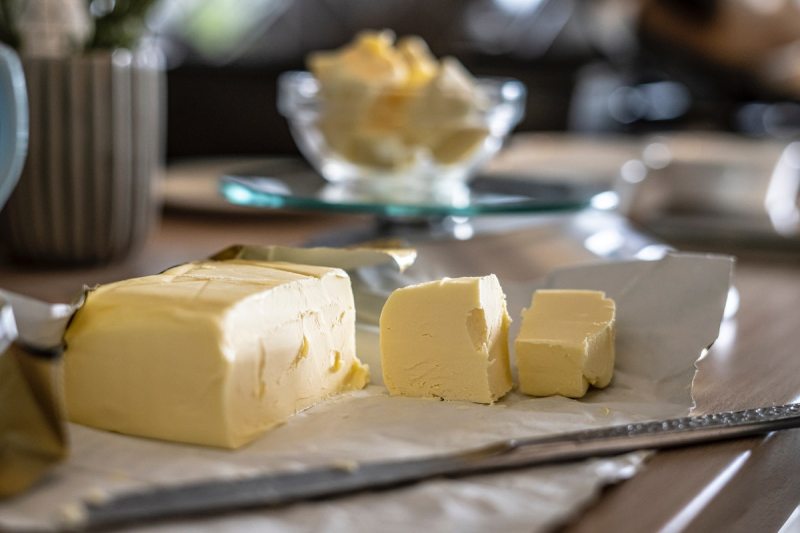
Butter
Butter is packed with saturated fat, which is why it is solid at room temperature. Each tablespoon has 7.2 grams (36% DV). Consider alternative fats like olive oil or avocado oil, both of which are notably present in the heart-healthy Mediterranean diet. Lard is especially high in saturated fat and should be avoided if possible. Dressings and condiments can also contain high levels of saturated fat. For example, mayonnaise, creamy dips, and salad dressings tend to be higher in saturated fat than oil-based dressings.
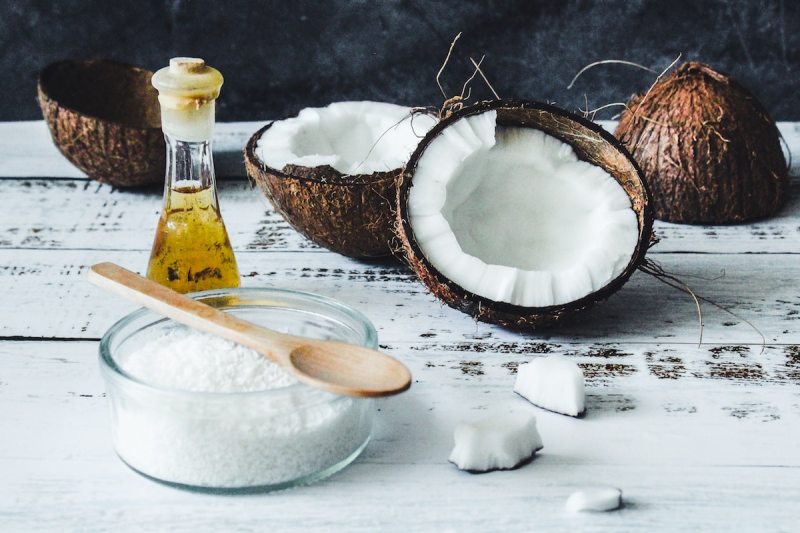
Coconut and coconut oil
Coconut, coconut oil, and other coconut food products are the rare exceptions on this list of foods high in saturated fat because they are generally considered to be somewhat healthy. A single ounce of dried coconut contains 16.2 grams of saturated fat (81% of the daily value), while one cup of coconut milk packs 214% of the daily value. While coconut is high in saturated fat (in fact, coconut oil is 92% saturated fat), these fats may be uniquely beneficial to the body.
For example, coconut is quite high in lauric acid, a medium-chain triglyceride that can increase HDL (“good”) cholesterol levels and may help increase fat metabolism in your body. Coconut oil also exhibits anti-microbial and antibacterial properties, can help nourish your hair and skin, and contains essential minerals. Therefore, don’t let the saturated fat content of coconut keep you from incorporating it into your diet.

Processed meats
Processed meats like pepperoni, salami, and cured sausage and ham are often packed with saturated fat, cholesterol, and sodium. Pepperoni usually has over 15 grams of saturated fat in just three inches, and salami isn’t too far behind. Again, with these meats, it’s ideal to consider the leanest options available or switch to a turkey version or vegan, soy version.

Pastries, doughnuts, and pies
Baked goods like pies, croissants, pastries, cakes, and doughnuts tend to be high in saturated fat because they are usually made with butter, shortening, and/or lard. Packaged baked goods, like muffins and snack cakes, can also contain significant amounts of trans fat, which is even more conclusively linked to adverse health and disease states than saturated fat.
The good news is that you don’t need to deny your sweet tooth entirely to meet your health and wellness goals. You can enjoy fruits like berries, pomegranates, kiwi, and citrus for a powerful dose of immune-supportive vitamin C and antioxidants. Dark chocolate is rich in minerals like iron and is packed with antioxidants known to decrease inflammation and the risk of several chronic diseases. You can also try healthier spins on favorite desserts, but harness the nutritive power of superfoods and make healthy substitutions.

Try these substitutions to cut down on saturated fat
If you’re looking to cut down on saturated fats in your diet, some simple steps can go a very long way. Looking at food labels is the first step; by law, every food product has a nutrition facts label that lists the total fat broken into saturated fat and trans fat. Look for foods that are low in saturated fat to make a healthier choice.
Also, making some substitutions in your cooking will help to reduce your saturated fat intake.
- Instead of cooking with butter, use olive oil as a healthier option.
- Choose skinless chicken, as that is where most of the fat is.
- Eat smaller portions.
- If you’re making tacos, substitute some of the red meat for low-fat ground turkey.



